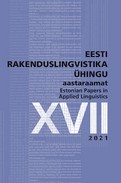VAGUE LANGUAGE IN ARGUMENTATIVE ESSAYS WRITTEN BY ADVANCED LITHUANIAN LEARNERS OF ENGLISH
VAGUE LANGUAGE IN ARGUMENTATIVE ESSAYS WRITTEN BY ADVANCED LITHUANIAN LEARNERS OF ENGLISH
Author(s): Jūratė RuzaitėSubject(s): Foreign languages learning, Language acquisition, Pragmatics, Comparative Linguistics, Baltic Languages
Published by: Eesti Rakenduslingvistika Ühing (ERÜ)
Keywords: frequency; pragmatic functions; (in)formality; argumentative essays; English; learner language; native speakers;
Summary/Abstract: This paper examines the use of vague language (VL) in argumentative essays written by advanced Lithuanian learners of English. The study focuses on two main categories of VL: general extenders (GEs), e.g. and so on, etc./etcetera, and or so, and vague quantifiers, e.g. some, many, a lot of, and a little. The present research, first of all, aims to assess how extensively Lithuanian learners of English use VL in comparison to native speakers. Second, quantitative corpus data is interpreted in view of the main functions that VL performs in non-native speakers’ essays to explain why there are differences in the frequency of VL. Finally, the frequency of VL is interpreted with regard to the formality of the items under investigation. The findings indicate that there are some major differences in the frequency of VL in English L1 and L2, both VL categories being more frequent in English L2.
Journal: Eesti Rakenduslingvistika Ühingu aastaraamat
- Issue Year: 2021
- Issue No: 17
- Page Range: 231-248
- Page Count: 18
- Language: English

